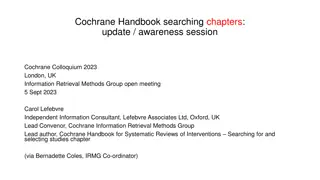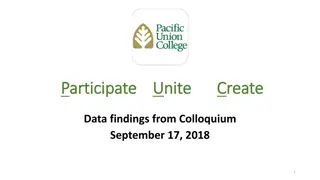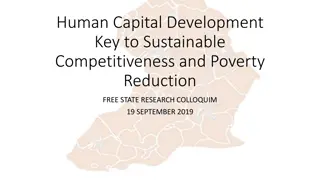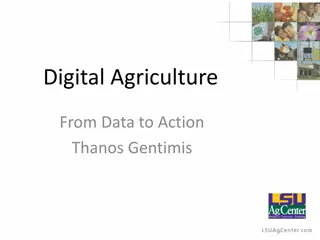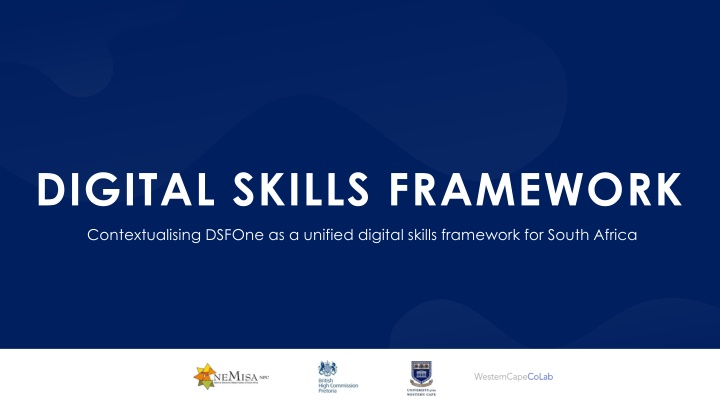
Unified Digital Skills Framework for South Africa - DSFOne Consultative Research
"Explore the DSFOne unified digital skills framework in South Africa, encompassing multiple competency areas and proficiency levels. Discover how this framework aims to enhance digital literacy, ICT practitioner skills, digital leadership, and more for the future of the nation. Join the discussion on stakeholder perspectives and the potential value of this innovative approach to digital skills development."
Download Presentation

Please find below an Image/Link to download the presentation.
The content on the website is provided AS IS for your information and personal use only. It may not be sold, licensed, or shared on other websites without obtaining consent from the author. If you encounter any issues during the download, it is possible that the publisher has removed the file from their server.
You are allowed to download the files provided on this website for personal or commercial use, subject to the condition that they are used lawfully. All files are the property of their respective owners.
The content on the website is provided AS IS for your information and personal use only. It may not be sold, licensed, or shared on other websites without obtaining consent from the author.
E N D
Presentation Transcript
DIGITAL SKILLS FRAMEWORK Contextualising DSFOne as a unified digital skills framework for South Africa
Agenda Digital Skills Framework DSFOne Consultative research project: Shared understanding of digital skills Round Table discussion: Stakeholder perspectives on potential value and application 2
Introduction & Context National Digital and Future Skills Strategy Function Funding for Digital Skills Role & Co-ordination Across Government Research & Monitoring Digital Skills Building Digital Skills Awareness Creating Society 4.0 Skills for Industry 4.0 The NDFSS presents a vision for the future of South Africa in which digital capabilities of all citizens are developed by embracing current and emerging technologies Digital Futures & Mastery Digital Foundations Enabler of the NDFSS 3
1 DSFOne
Introduction to DSFOne Initiated in 2013 DSFOne Unified framework to incorporate multiple sectoral perspectives on digital skills Locally relevant Positioned within the international discourse on digital skills frameworks DSFOne documentation: https://www.wcapecolab.org/dsf1
Digital Skills Defined: Six Competency Areas DSFOne 8 Proficiency Levels
Digital Skills: From Basic to Advanced Two integrated frameworks Digital skills from basic to advanced Two integrated frameworks DSFOne Cyber- security Advanced levels of ICT practitioner skills; Quantum computing digital leadership skills; user digital skills (incorp. domain/ sector skills) . Cognitive technologies AI Advanced digital business systems & marketplaces Additive manufacturing Data & Algorithms Robotics Data analytics Data, algorithms and AI forming the core triad Blockchain Reality+ Cloud compu- ting 5G networks Exten- sive connec- tedness Digital Skills Framework One (DSFOne) Digital Skills Framework Advanced (DSFA) 7
Key characteristics as Unified Framework Digital Competence as foundational building block Application within 4 segments or ecosystems: Digital Literacy (for work and life work readiness skills) DSFOne ICT Practitioner Skills Advanced digital user skills as these relate to work sectors/industries Digital Leadership Competence
2 Project for a shared understanding
Project Intent Function Role & The National Electronic Media Institute of South Africa (NEMISA) as one of the key implementers of this strategy, in collaboration with the University of the Western Cape (CoLab) and funded by the British High Commission, wishes to contribute towards the digital skills strategy implementation, by means of initiating a participatory research and consultation process in view of a shared understanding of a national digital skills framework
Project Team Function Role & NEMISA: Trevor Rammitlwa Antoinette Young Victoria Tau Funder: British High Commission Gabriel Ramokotjo Kim Hoffman University of the Western Cape Leona Craffert (Dr) Walter Claassen (Prof.) Natasha Katunga (Dr) Carlynn Pokpas (Dr) Neerali Gajjar
Benefits for the Digital Skills Ecosystem Function Role & Individuals Self-evaluation of competence Awareness of the in-demand digital skills sets Specification of digital skills requirements for job roles Training Providers and Institutions of Learning Gain insights into sector trends and in-demand skills Structure in-demand digital skills training Ensure up-to-date and relevant curricula Employers Government Agencies Establish a shared understanding and common language Align standards, policies and strategies Coordinate development initiatives and development of measurement instruments Identify gaps; put strategies & interventions in place Articulate digital skills requirements for job categories Guide reskilling / upskilling employees Guide decision making for strategic skills interventions
3 Round Table Discussion: Stakeholder Perspectives
Round Table Participants: Mr Andy Searle: Director: Paladin Consulting; Collective X Mr John April: Director in the Office of the CEO, Quality Council for Trades and Occupations (QCTO) consciously avoids setting out specific digital skills, as such an approach would risk excluding continuously emerging new areas of skills development and new areas of technology application. CHAIR: Mr Trevor Rammitlwa Prof. Debbie Collier: Dept. of Mercantile and Labour Law, (UWC) and Director of CENTROW Mr. Mlindi Mashologu Deptuty-Director General, Department of Communication and Digital Technologies Digital and Future Skills Strategy CEO: NEMISA 14





